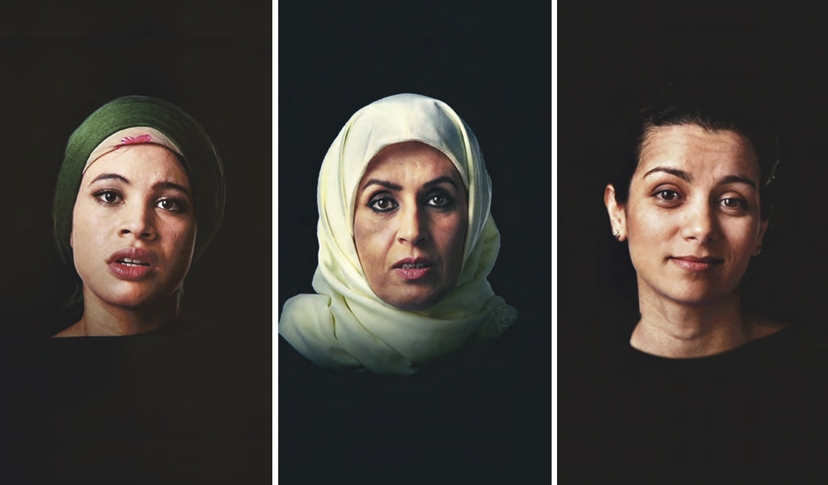…Cairo stories
A project by Judith Barry exploring the many different ways women negotiate ideological, cultural and economic conditions in Cairo.
Slought is pleased to present …Cairo stories, a video and photographic installation by Judith Barry, on display at Slought from September 5 to October 15, 2014. Created from a collection of more than 200 interviews Barry conducted with Cairene women between the US invasion of Iraq in 2003 and the beginning of the Egyptian Revolution in 2011, …Cairo stories is a series of short video monologues. The selection of stories chronicles personal experiences of women from a variety of social and economic classes in Egypt and expands the artist’s concerns with notions of representation, history, subjectivity, and translation — particularly as these ideas circulate across cultures.
The original interviews were conducted in simultaneous translation to maintain fluidity and integrity of tone and meaning, and Barry considers them to be collaborations between her and the subjects. The vast source material was then ‘vetted’ by a diverse range of Cairene women. The emotional integrity of each woman’s story is the crux of this project; the translators and interviewees remained active participants in both the narrative arc of their stories and the development of the project. In the gallery, a selection of 15 narratives is performed by actors, highlighting that all stories, including those we tell ourselves, are ultimately fictions.
…Cairo stories is a continuation of Not reconciled, a series of ‘as told to’ stories Barry recorded in a variety of countries and cultures, and bears witness to the artist’s long-term interest in the strength and the political implications of the voice. Since the Egyptian revolution, the voice — and the right to vote or ability to speak out — has become a central concern in everyday life. The positions of women in the public, political — and private — spheres is also at the forefront of these discussions.
Since the 1970s, feminists such as Hélène Cixous have written about the continued importance of self-historicization by women to ‘transform their history, to seize the occasion to speak.’ This philosophic position of écriture féminine directly addresses the transformation of subjectivity and the contention of sanctioned identity. It is through both writing and foregrounding the female voice that …Cairo stories opens a space for embodying a new subjectivity.
“I consider that all projects involving other people are collaborations, even if they are not acknowledged as such. This project would not have been possible without the tremendous generosity and effort of many people, each of whom, in different ways, was a key collaborator in the truest sense of the word. While many do not want to be named, I want to underscore how important their contribution is.
My gratitude goes to the more than 215 women who generously shared their stories, to the numerous remarkable translators who were my interlocutors and advisors, to the many other friends who put me in touch with interesting and interested women in Cairo, to the talented actors who gave voice to these stories in English, Arabic and German, and to the casting agencies, crews, post production and staging companies who brought this project to life, and to the many friends who also contributed in so many other ways.
Additionally, I am also grateful to the foundations, institutions, exhibitions, and galleries who have and continue to support the project. This project is dedicated to all the women and men who are working to bring about progressive social change, not just in North Africa and the Middle East (MENA), but also around the world. As we all know from watching recent events unfold, poverty isn’t what produces revolution imagination, hopes and dreams do…”
— Judith Barry
This project was co-commissioned by Sharjah Art Foundation, UAE, Foundation Daniel Langlois, Montreal, John Simon Guggenheim Foundation, NYC, and American University in Cairo, Egypt.
With thanks to Hoor Al-Qasimi, Livia Alexander, Rhea Anastas, Narat Arkadan, Negar Azimi, Scott Bailey, Heike Bachmann, Regine Basha, Eder Cetina, Dalia Basiouny, Ute Meta Bauer, Nadim Bawalsa, Mariam Bazeed, Amy Ben-Ezra, J. Cameron Brueckner, Daniel Biovin, Johanna Burton, Alex Chau, Ewan Clow, Suzanne Cotter, Catherine David, Meena Dimian, Luke Di Tomma, Daniel Edelman, Hannan Eldahry, Regaa Eldahry, Anne Ellegood, Mona El-Mousfy, Antoinette Elias, Nawal Es-Sabahi, Ruth Estevez, Rosamund Felsen, Timothy Ferris, Jean Fisher, Victoria Frings, Miriam Ghani, Mariam Habib, Hanan E. Kamal, Aleya Hamza, Daniel Koppich, Larissa Harris, Dan Hartnett, Randy Hudson, Ahd Kamel, Hanan Kamal E, Heba Khalilm Omar Kholeif, Lameece Issaq, Brian McKenna, Marwa Maziad, Leanne Mella, Julia Meltzer, Deborah Meister, Joe Monge, Carlos Moore, Sohrab Mohebbi, Susan Morris, Nimet Naguib, Fatima Negaran, Bettina Niedermann, Kareemeh O, Nagham Osman, Jack Persekian, Michelle Rafic, Dina Ramadan, Ayman Ramadan, Brad Rego, Betsy Reid, Sarah Rifky, Marrin Robbins, Lisa Rubenstein, Fred Ruckel, Karin Sachs, Ken Saylor, Nadine Selim, Maya Serhan, Beth Stryker, Dalia Suleiman, Lynn Taylor, Aida El Torie, Townhouse Gallery, William Wells, Brian Kuan Wood, Jack Young, Renate Wagner, Simon Weber, Wolke, Rasha Zamamiri, Kathy Zarur and especially the many women who generously shared their stories with me and the actors who brought their stories to life.
